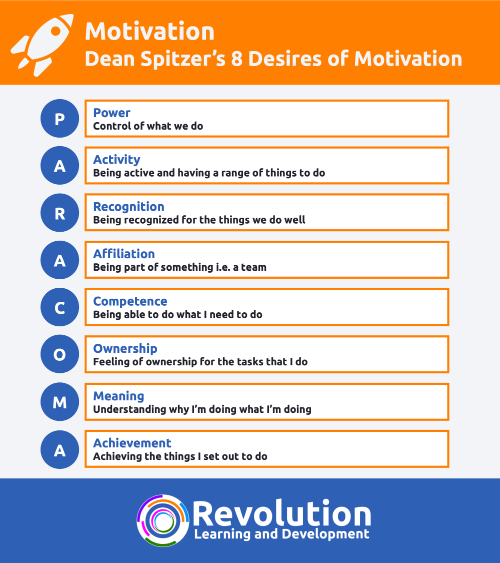Background
Dr. Dean Spitzer described 8 desires of motivation in his book titled Supermotivation. Spitzer’s 8 desires of motivation are somewhat linked to Hertzberg’s internal motivators and provide some guidance on what motivates us and other people.
Unlike other motivational models and theories, Spitzer’s 8 desires of motivation go some way to provide a more practical approach to motivation by providing tiles and actions to the actual motivators, rather than trying to provide a more physiological angle of understanding.
This makes it easier to pinpoint what out motivators are and therefore, allow us to provide some practical things we can do to motivate ourselves and others.
Dean Spitzer’s 8 Desires of Motivation
Dean Spitzer’s 8 Desires of Motivation are:
- Desire for Power
- Desire for Activity
- Desire for Recognition
- Desire for Affiliation
- Desire for Competence
- Desire for Ownership
- Desire for Meaning
- Desire for Achievement
These can be remembered using the pneumonic PARACOMA

The Desire for Power
The first of Dean Spitzer’s 8 Desires of Motivation is the desire for power.
We want to feel in control of where we are going. This can sometimes be difficult if we work in an organisation with a top-down structure. We want to feel like we are controlling our future and we can do this by working out where our individual goals, targets and objectives fit into the organisation’s strategy or our longer-term life goals.
If we are motivating others, we should help them to see the above to satisfy their desire for power.
The Desire for Activity
The second of Dean Spitzer’s 8 Desires of Motivation is the desire for Activity.
We want to be active and have a range of different things to do. Sometimes our job forces us into monotony as we follow processes and procedures or carry out repetitive tasks. We do them because we have to; however, internally we know that we don’t want to be doing these. We could ask for more responsibility or other tasks to carry out.
If we are motivating others, we should involve our team in discussions about their role and what they would like to do and how they would like to do it.
The Desire for Recognition
The third of Dean Spitzer’s 8 Desires of Motivation is the desire for Recognition.
We want to be recognised for the things we do well and feel appreciated by others. A simple thanks or some feedback on a job or task carried out can go a very long way. This is a great way of energising people to want to do more.
The Desire for Affiliation
We want to feel part of something, whether it be the local team or the wider organisation. we can look for ways to engage ourselves more in team activities such as meetings and build great relationships with others.
If you have responsibility for motivating others, doing things to create a team environment will energise those who are social and will create a stronger team bond. Help people to see where they fit into the organisation.
The Desire for Competence
We want to feel that we have the right level of skills and knowledge to carry out the tasks we need to do. Asking questions, gaining knowledge and attending development sessions can go a long way to helping us to satisfy this desire.
If you are motivating others, you can satisfy this desire by providing training and development to your people to be better at their jobs and provide the energy these people need.
The Desire for Ownership
We want to feel as though we own our own tasks or jobs. Physiological ownership can be even more powerful than physical ownership. Sharing your ideas of how things could be done and committing to getting things done will help satisfy this desire.
If you are motivating others. delegate ownership of tasks and don’t just use GOFER delegation. Agree on objectives and ensure you discuss what THEY are going to do.
The Desire for Meaning
We want to understand why we are doing what we are doing. We want to understand the purpose of what we do. If this is missing, we should ask the questions to find out the ‘why’.
If we are motivating others, we should explain the why. If they have to press a button all day at work, ensure they know why and what the consequences of not pressing the button are. People want to know what difference they are making.
The Desire for Achievement
We want to achieve what they set out to do, whether it’s to climb a mountain or a work based objective. Setting ourselves clear goals, targets and objectives to achieve will help satisfy this desire. Don’t make them too big though. If you have a big goal, break it down into smaller goals and achieve one at a time. If the achievement seems too far away, this will become a de-motivator rather than a motivator.
If you are motivating others, help people to understand how realistic their goals are, envisage what problems they may encounter and what they will do to overcome them.
Further Learning
If you wish to find out more about Dean Spitzer’s 8 Desires of Motivation and more tactics of how to use them, you may find a motivational skills training course will help. Take a look at our Motivational Skills Training Course for more details.





